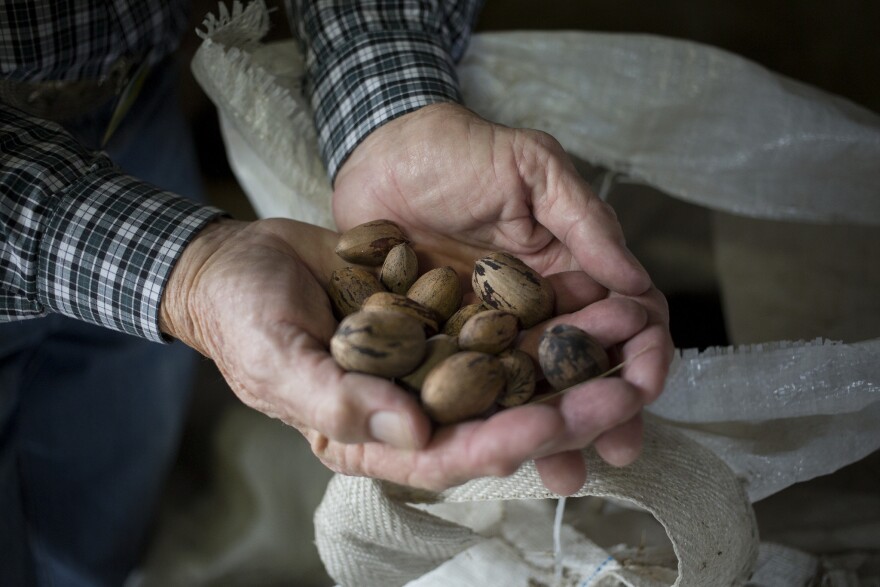At the corner of 16th and Salinas streets, Leticia Hurtado and Yolanda Lopez are on the sidewalk formulating their plan of attack. The pecan tree they’re standing under has good nuts, but many of them are too far up in the branches to reach.
“You could climb up like a cat, if you like,” Lopez joked in Spanish.
No one makes a move.
Both women are originally from Mexico. Now, they live on the same street in this East Austin neighborhood. When they have free time they like to walk around gathering nuts – not to eat, but to sell.
The Hunters
It’s still early in the season, but in previous years Hurtado and Lopez have made between 50 and 70 cents a pound, a number that will only grow the more the nuts change hands. The reason? Pecan hunts are not only a beloved Texas tradition this time of year, they’re often the first link in a supply chain for a booming global commodity.

Hurtado holds up what she’s collected so far in a plastic shopping bag.
“I thought it was one pound, but it’s more like two,” she said. “I think the bag can hold ten pounds. It’s heavy!”
All over Texas people like Hurtado are bringing shopping bags of nuts to buyers. You can find the buyers working out of scrap yards, in empty lots. The most important thing for a pecan buyer is to own a really big scale, like the kind you’ll find in the warehouse of Callahan’s General Store.
The Buyers
“I was going to say this is not your grandfather scale, but it is,” said Mike Young, general manager of the store. "This is an old-timey platform scale. We don’t do a digital scale around here.”
At Callahan’s, about four miles from where Hurtado and Lopez stood under the tree, the pecan business is done in a cattle auction house that’s been converted into the store’s warehouse.
Young runs Callahan’s and, by extension, the side business in pecan buying.
“We’re a general store. We do everything we can to make it work,” he chuckled.

Collecting nuts visitor-by-visitor brings impressive results. Callahan’s can fill truckloads of pecans on a good year, says Young, pointing to bags the size of some camping tents.
“These bags will hold about probably 1600 pounds of pecans when we get them filled up,” he said. “I like to see when we have 15 or 20 of these bags lined up, that means we’ve done pretty well for the year”
The fact that some of the nuts he buys are not farm-raised lowers their value. They haven’t been sorted, checked for water content or even size and quality.
“They’re not gonna hang these in the Louvre,” Young said.
Last, he was only offering 25 cents a pound, but, he said, that price could go higher. He was buying low because he hadn’t received a quote from the guy he sells to yet.
“Twenty-five cents is a safe deal,” he said. “If he goes up, then I’ll have to pay more, so I can be competitive with the people that are playing in the game against me.”
The Accumulators
The guy Young is waiting to talk to, the next link in the chain, is usually a person called an accumulator.
Buddy Adams is just such a person. He runs R.B. Bagly and Sons out of San Saba Texas.

“We’re real busy this time of year because the crop's coming in, and we’ve got trucks going out on the road going to our different buying stations,” said Adams.
The price Adams offers also depends on what he can sell the pecans for once he gets together enough of them to sell in large lots.
According to the U.S. Department of Agriculture, some farm-raised nuts go for around $5 a pound, pecans from yard trees fetch between one and two bucks a pound.
All together, Adams says his company can sell up 20 million pounds in a good year.
Happy New Year
Most of those go to shelling companies, where they might be shelled and then sold to ice cream companies, confectioneries and anyone who uses shelled pecans.
Others go to China. In fact, over the last several years the Chinese pecan market has exploded.
“Their big deal is for their Chinese New Year,” said Adams. “They’ll sit around the table and have a bowl of pecans and talk and visit with friends and relatives.”
So, could a pecan sitting in that bowl have come from the same tree in East Austin that vexed Leticia Hurtado and Yolanda Lopez?

“Oh yeah,” Adams said. “Sure could”
Good news for next Chinese New Year. Back at that tree, Leticia Hurtado came up with a solution to her dilemma. She gave the branch a shake.
"We move the branch like this and the mature nuts fall to the ground,” she said.
The pecans hit the sidewalk and into the bag they went – the start of a long and complicated journey.





